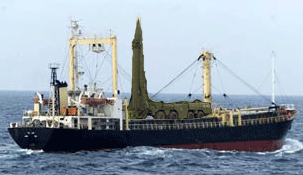
Uh oh. DoD Finds Cruise Missile Defense 'Gaps':
Pentagon and Missile Defense Agency officials increasingly are concerned with the threat of terrorists using a cargo ship to fire cruise and ballistic missiles just off U.S. shores but outside its territorial waters.See my earlier post on missile attacks from offshore "cargo" ships here.
“I am concerned about that,” MDA Director Lt. Gen. Trey Obering said at a breakfast with reporters in July 2005. Lockheed Martin is proposing an architecture of Patriot missile batteries and Aegis systems to protect the United States against Scuds fired offshore, he explained.
“We have also taken steps to upgrade certain [continental U.S.]-based radars to provide a coverage against an asymmetric threat,” Obering added. “We are looking at other alternatives that will provide coverage and would provide some protection.”
In August 2004, MDA provided a target to the Israeli Arrow program during an intercept test off the coast of California where a Scud target missile was launched from an ocean-going platform.
“It was not hard,” Obering said last year. “It was very easy to do. It was not technically challenging to do.”
When asked how that compares to a cruise missile, Obering said: “The thing about cruise missiles is we have a capability to shoot them down today. As long as we can detect them. We don't have the capability over wide areas to do that with ballistic missiles.” ***
The final capability gap involves not having enough weapons-delivery platforms available to cover the North American continent, according to the RFI, and even then, many of the available platforms are unable to “negate advanced cruise missiles and other irregular platforms.”
***
Developing a robust capability to intercept a cruise missile launched from a ship offshore is “very controversial around town,” with some believing a more likely scenario would be terrorists smuggling a weapon of mass destruction in a container cargo ship into a U.S. port, according to Ben Stubenberg, chief of analysis and scenarios at MDA.
However, the threat of a missile attack from commercial vessels off the coast “is something we need to worry about very much,” he said April 28 at a conference sponsored by Defense News.
Offshore bombardment “is not something new historically,” Stubenberg said. “Ever since the cannon was invented and they put those cannons and rockets and so forth on ships, this has been a problem.”
The challenge for the United States is that its long coast and dependence on shipping are among the factors that render it vulnerable to seaborne attack, he said.

No comments:
Post a Comment